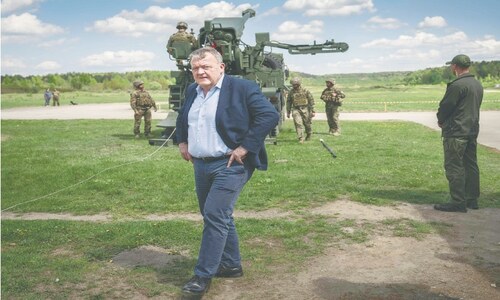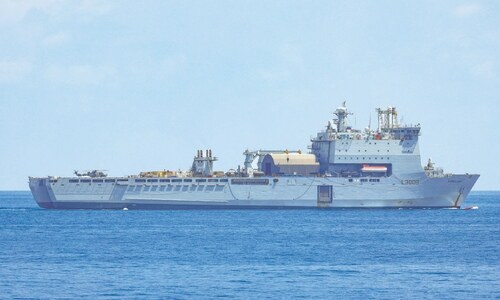PRISTINA: When in December Serbia put forces on highest combat alert in response to increasing violence in Kosovo between police and minority Serb protesters, a shareholder in Pristina’s newest shopping mall began getting calls from unnerved investors.
“International companies that were supposed to arrive for the first time in Kosovo told us that they were delaying opening shops due to the unstable situation,” Fatmir Zymberi told. “This meant for them Kosovo is a dangerous region.” Intense Western diplomacy halted a feared slide back into armed conflict in the run-up to the 15th anniversary on Feb 17 of ethnic Albanian-majority Kosovo’s independence from Serbia, the outcome of a 1998-99 guerrilla uprising.
But unresolved grievances continue to prevent normal neighbourly relations between Pristina and Belgrade. Western mediators see scant chances of a breakthrough soon with national leaders appearing disinclined to real compromise, at a time when Russia’s war on Ukraine has raised fears of regional turmoil.
The main, longstanding fount of tensions is the refusal of 50,000 ethnic Serbs in north Kosovo to recognise the government in Pristina or Kosovo as a separate country. They instead regard Belgrade as their capital, and Serbia’s constitution still treats Kosovo as an integral part of its territory.
The area of north Kosovo where ethnic Serbs form a majority looks in some respects like an extension of Serbia.
Teachers, doctors and public employees in the region receive their pay and benefits from Belgrade. Residents of Serb-majority municipalities do not pay taxes either to Belgrade or Pristina, or pay for energy provided by Kosovo’s state utility.
Serbian flags wave in the streets, murals proclaiming Kosovo to be an eternal part of Serbia can be seen on walls, and shops prefer the Serbian dinar to the euro used elsewhere in Kosovo.
The stand-off has been the spark for numerous confrontations on the ground, with Serbs erecting barricades and clashing with Kosovo state police trying in vain to impose state authority.
When Pristina late last year acted to enforce a ruling that Serbs switch from Serbian car license plates — dating back to the 1990s — to those issued by Pristina, violence erupted with Serb protesters blocking roads and exchanging fire with police.
Border crossings were blocked. Serbia put its army on highest alert and asked the Nato peacekeeping force in Kosovo for clearance to send 1,000 troops there for the first time since 1999 — which Nato refused, while Pristina accused Belgrade of seeking to destabilise Kosovo with ally Russia’s help.
The Kremlin denied influencing Serbia to stir up conflict, saying Belgrade was just defending the rights of Kosovo Serbs. After crisis mediation by European Union and US diplomats, and a Pristina agreement to put off enforcement of the car registration rules to late 2023, Serbia lifted its alert, barricades were dismantled and an edgy calm returned.
In mid-2022, the EU backed by Washington presented an 11-point peace and normalisation plan to the two sides. Last month, mediators urged them to accept it or face repercussions including loss of support for their EU membership bids.
As part of the plan, Serbia would stop lobbying against a Kosovo seat in global organisations like the United Nations, and Kosovo would create an association of semi-autonomous Serb-majority municipalities, tackling complaints of discrimination.
In early February, both Kosovo Prime Minister Albin Kurti and Serbian President Aleksandar Vucic hinted at readiness to approve the plan but said further negotiations would be needed.
EU foreign policy chief Josep Borrell said he would invite the two leaders to Brussels for meetings soon. But Vucic said he wanted a Serb municipalities group set up before such talks, while Kurti wanted them to address “international guarantees”.
There is little hope this dialogue will actually get anywhere. The current government in Kosovo is made up of such hardliners that they even make Vucic look like a reasonable statesman, a senior EU diplomat, said.
So Vucic can show he is engaging without much risk he would actually have to do hard things. It’s all bound to unravel on the Kosovo side first.
Published in Dawn, February 14th, 2023

















































Dear visitor, the comments section is undergoing an overhaul and will return soon.